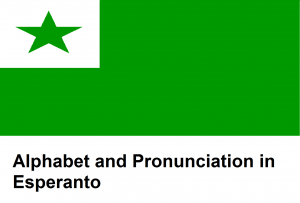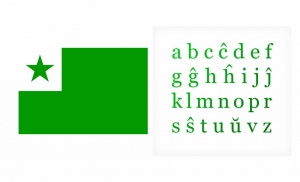Difference between revisions of "Language/Esperanto/Pronunciation/Alphabet-and-Pronunciation"
(Alphabet and Pronunciation in Esperanto) |
|||
| Line 4: | Line 4: | ||
Hello everybody, | Hello everybody, | ||
In today's lesson you will learn | In today's lesson you will learn everything about the '''¨ALPHABET AND PRONUNCIATION¨''' in Esperanto. | ||
Feel free to edit this page by adding new words and expressions ! | Feel free to edit this page by adding new words and expressions ! | ||
| Line 10: | Line 10: | ||
Good learning ! :) | Good learning ! :) | ||
. | The Esperanto alphabet: a b c ĉ d e f g ĝ h ĥ i j ĵ k l m n o p r s ŝ t u ŭ v z | ||
Note that the names of the letters (used when spelling aloud, etc.) are a, bo, co, ĉo, do, e, fo, go, ĝo, ho, ĥo, i, etc. | |||
That is, the consonants get an ’o’ after them, and the name of each vowel is the sound of the vowel itself. | |||
Note that "ŭo" is pronounced sort of like English ’wo’. | |||
There are 26 letters in the English alphabet; 28 in Esperanto. | |||
In Esperanto there is no q, w, x, or y. In Esperanto there are 6 letters not found in English (all 6 have accent marks): ĉ, ĝ, ĥ, ĵ, ŝ [all circumflexes], and ŭ [a u-breve]. | |||
The Esperanto letters ’j’ and ’ŭ’ are not vowels and can combine with real vowels (a, e, i, o, and u) to make ’vowel glides’ which must be learned as separate sounds (below). | |||
Pronunciation Guide Remember, in Esperanto: one letter - one sound. No exceptions. | |||
== Vowels== | |||
Vowel Sounds (accented/emphasized vowels are capitalized) | |||
a as in Ma, father: blANka sAna grAnda vArma | |||
e as in send, met: bEla plEna vErda pEti | |||
i as in me, three: vIvi Ami trInki fIlo | |||
o as in more, or: Ovo dOmo kIo nOva | |||
u as in two, soon: Unu plUmo sUno butIko | |||
== Consonants== | |||
Consonant Sounds (mainly as in English, except:) | |||
c pronounced ’ts’ in nests: dAnco leciOno bicIklo | |||
ĉ pronounced ’ch’in church: ĉAmbro sandvIĉo ĉokolAdo | |||
g pronounced ’g’ in great: sagEto gustUmi geografIo | |||
ĝ pronounced ’g’ in George: mAnĝi lOĝi sEĝo | |||
ĥ pronounced ’ch’in Bach: jAĥto ĥOro Eĥo | |||
j pronounced ’y’ in yet: jEs jAro jUna | |||
ĵ pronounced ’s’ in leisure: ĵurnAlo teatrAĵo ĵalUzo | |||
ŝ pronounced ’sh’in shoe: ŝAti pOŝo ŝUo | |||
ŭ is used most often in the combination ’aŭ’ or ’eŭ’ (otherwise it has a ’w’ sound, as in weather). | |||
Remember: All sounds presented in this Pronunciation Guide are approximations. They are the closest approximations for North American English-speakers. | |||
Vowel Glides (diphthongs). The following combinations between a vowel (a, e, o, u) and ’j’ or ’ŭ’ make one sound: | |||
aj pronounced as ’eye’: mAjo kAj semAjno | |||
oj pronounced as in ’boy’: knAboj vojAĝi ĝOjo | |||
ej pronounced as in ’they’: plEj mEjlo lernEjo | |||
uj pronounced ’oo-ee’ (quickly) tUj AnglUjo monUjo | |||
aŭ pronounced as in ’cow’: nAUX Antaŭ ĵAUXdo | |||
eŭ pronounced as in ’wayward’: EŭrOpo neŭtrAla EŭklIdo | |||
In all the examples above, the vowel of the stressed (or accented) syllable has been capitalized. This follows the rule without exception that every word in Esperanto is stressed on the next-to-last syllable. | |||
Here is a list of words (and translations) that represent sounds in Esperanto [not just those covered above]. Practice them carefully and your pronunciation will get better and better. | |||
Anglujo England | |||
lernejo school | |||
antaŭ before | |||
majo May | |||
aĉeti to buy | |||
manĝi to eat | |||
biciklo bicycle | |||
mejlo mile | |||
ĉambro room | |||
monujo purse | |||
ĉokolado chocolate | |||
neŭtrala neutral | |||
danco dance | |||
ovo egg | |||
domo house | |||
plej most | |||
eĥo echo | |||
plena full | |||
Eŭropo Europe | |||
poŝo pocket | |||
Eŭklido Euclid | |||
sageto dart | |||
sandviĉo sandwich | |||
gustumi to taste | |||
seĝo seat, chair | |||
ĝojo joy | |||
suno sun | |||
ĥoro choir | |||
ŝati to like | |||
jaĥto yacht | |||
ŝuo shoe | |||
juna young | |||
teatraĵo (theatrical) play | |||
ĵaluzo jealousy | |||
tuj immediately | |||
ĵaŭdo Thursday | |||
vojaĝi to travel | |||
ĵurnalo newspaper | |||
== '''Some Explanations for the Alphabet and Pronunciation in Esperanto''' == | == '''Some Explanations for the Alphabet and Pronunciation in Esperanto''' == | ||
| Line 222: | Line 334: | ||
|} | |} | ||
<youtube>bLx5hLag6WQ</youtube>[[File:esperanto-alphabet.jpg|thumb]] | |||
==Video== | |||
<youtube>bLx5hLag6WQ</youtube> | |||
==Sources== | |||
https://esperanto-afriko.webs.com/kurso%20angle.pdf | |||
[[File:esperanto-alphabet.jpg|thumb]] | |||
[[Category:Alphabet-and-Pronunciation]] | [[Category:Alphabet-and-Pronunciation]] | ||
Revision as of 21:18, 30 September 2021
.
Hello everybody,
In today's lesson you will learn everything about the ¨ALPHABET AND PRONUNCIATION¨ in Esperanto.
Feel free to edit this page by adding new words and expressions !
Good learning ! :)
The Esperanto alphabet: a b c ĉ d e f g ĝ h ĥ i j ĵ k l m n o p r s ŝ t u ŭ v z
Note that the names of the letters (used when spelling aloud, etc.) are a, bo, co, ĉo, do, e, fo, go, ĝo, ho, ĥo, i, etc.
That is, the consonants get an ’o’ after them, and the name of each vowel is the sound of the vowel itself.
Note that "ŭo" is pronounced sort of like English ’wo’.
There are 26 letters in the English alphabet; 28 in Esperanto.
In Esperanto there is no q, w, x, or y. In Esperanto there are 6 letters not found in English (all 6 have accent marks): ĉ, ĝ, ĥ, ĵ, ŝ [all circumflexes], and ŭ [a u-breve].
The Esperanto letters ’j’ and ’ŭ’ are not vowels and can combine with real vowels (a, e, i, o, and u) to make ’vowel glides’ which must be learned as separate sounds (below).
Pronunciation Guide Remember, in Esperanto: one letter - one sound. No exceptions.
Vowels
Vowel Sounds (accented/emphasized vowels are capitalized)
a as in Ma, father: blANka sAna grAnda vArma
e as in send, met: bEla plEna vErda pEti
i as in me, three: vIvi Ami trInki fIlo
o as in more, or: Ovo dOmo kIo nOva
u as in two, soon: Unu plUmo sUno butIko
Consonants
Consonant Sounds (mainly as in English, except:)
c pronounced ’ts’ in nests: dAnco leciOno bicIklo
ĉ pronounced ’ch’in church: ĉAmbro sandvIĉo ĉokolAdo
g pronounced ’g’ in great: sagEto gustUmi geografIo
ĝ pronounced ’g’ in George: mAnĝi lOĝi sEĝo
ĥ pronounced ’ch’in Bach: jAĥto ĥOro Eĥo
j pronounced ’y’ in yet: jEs jAro jUna
ĵ pronounced ’s’ in leisure: ĵurnAlo teatrAĵo ĵalUzo
ŝ pronounced ’sh’in shoe: ŝAti pOŝo ŝUo
ŭ is used most often in the combination ’aŭ’ or ’eŭ’ (otherwise it has a ’w’ sound, as in weather).
Remember: All sounds presented in this Pronunciation Guide are approximations. They are the closest approximations for North American English-speakers.
Vowel Glides (diphthongs). The following combinations between a vowel (a, e, o, u) and ’j’ or ’ŭ’ make one sound:
aj pronounced as ’eye’: mAjo kAj semAjno
oj pronounced as in ’boy’: knAboj vojAĝi ĝOjo
ej pronounced as in ’they’: plEj mEjlo lernEjo
uj pronounced ’oo-ee’ (quickly) tUj AnglUjo monUjo
aŭ pronounced as in ’cow’: nAUX Antaŭ ĵAUXdo
eŭ pronounced as in ’wayward’: EŭrOpo neŭtrAla EŭklIdo
In all the examples above, the vowel of the stressed (or accented) syllable has been capitalized. This follows the rule without exception that every word in Esperanto is stressed on the next-to-last syllable.
Here is a list of words (and translations) that represent sounds in Esperanto [not just those covered above]. Practice them carefully and your pronunciation will get better and better.
Anglujo England lernejo school antaŭ before majo May aĉeti to buy manĝi to eat biciklo bicycle mejlo mile ĉambro room monujo purse ĉokolado chocolate neŭtrala neutral danco dance ovo egg domo house plej most eĥo echo plena full Eŭropo Europe poŝo pocket Eŭklido Euclid sageto dart sandviĉo sandwich gustumi to taste seĝo seat, chair ĝojo joy suno sun ĥoro choir ŝati to like jaĥto yacht ŝuo shoe juna young teatraĵo (theatrical) play ĵaluzo jealousy tuj immediately ĵaŭdo Thursday vojaĝi to travel ĵurnalo newspaper
Some Explanations for the Alphabet and Pronunciation in Esperanto
| PRONUNCIATION ENGLISH | ESPERANTO | PRONUNCIATION
BRAZILIAN PORTUGUESE |
|---|---|---|
| ah | A | a |
| b | B | b |
| ts | C | ts |
| ch | Ĉ | tch |
| d | D | d |
| eh | E | e |
| f | F | f |
| g | G | Sempre a letra (g) como em ga / gue / gui / go / gu
Obs.: nunca como em girafa / gelo (som de j) |
| j | Ĝ | dj |
| h | H | H |
| kh | Ĥ | H |
| ih | I | i |
| ih | J | i |
| zh | Ĵ | Letra (j) como em janela / jeito / jipe / jóia / jumento |
| k | K | k |
| l | L | l |
| m | M | m |
| n | N | n |
| oh | O | o |
| p | P | p |
| r | R | r |
| s | S | s |
| sh | Ŝ | ch |
| t | T | t |
| ou | U | u |
| ou | Ŭ | u |
| v | V | v |
| z | Z | z |
Esperanto pronunciations are designed to be simple, though there is still an alveolar trill.
| Letter | A a | B b | C c | Ĉ ĉ | D d | E e | F f | G g | Ĝ ĝ | H h | Ĥ ĥ | I i | J j | Ĵ ĵ | K k | L l | M m | N n | O o | P p | R r | S s | Ŝ ŝ | T t | U u | Ŭ ŭ | V v | Z z |
|---|---|---|---|---|---|---|---|---|---|---|---|---|---|---|---|---|---|---|---|---|---|---|---|---|---|---|---|---|
| IPA | a | b | t͡s | t͡ʃ | d | e | f | g | d͡ʒ | h | x | i | j | ʒ | k | l | m | n | o | p | r | s | ʃ | t | u | u̯ | v | z |
If you can't input the accented letters, there are two alternations : 1. add an "x" after the letter; 2. add an "h" after the letter except "u".
Esperanto keyboard software for Windows
| Diphthong | aj | ej | oj | uj | aŭ | eŭ |
|---|
Video
Sources
https://esperanto-afriko.webs.com/kurso%20angle.pdf

